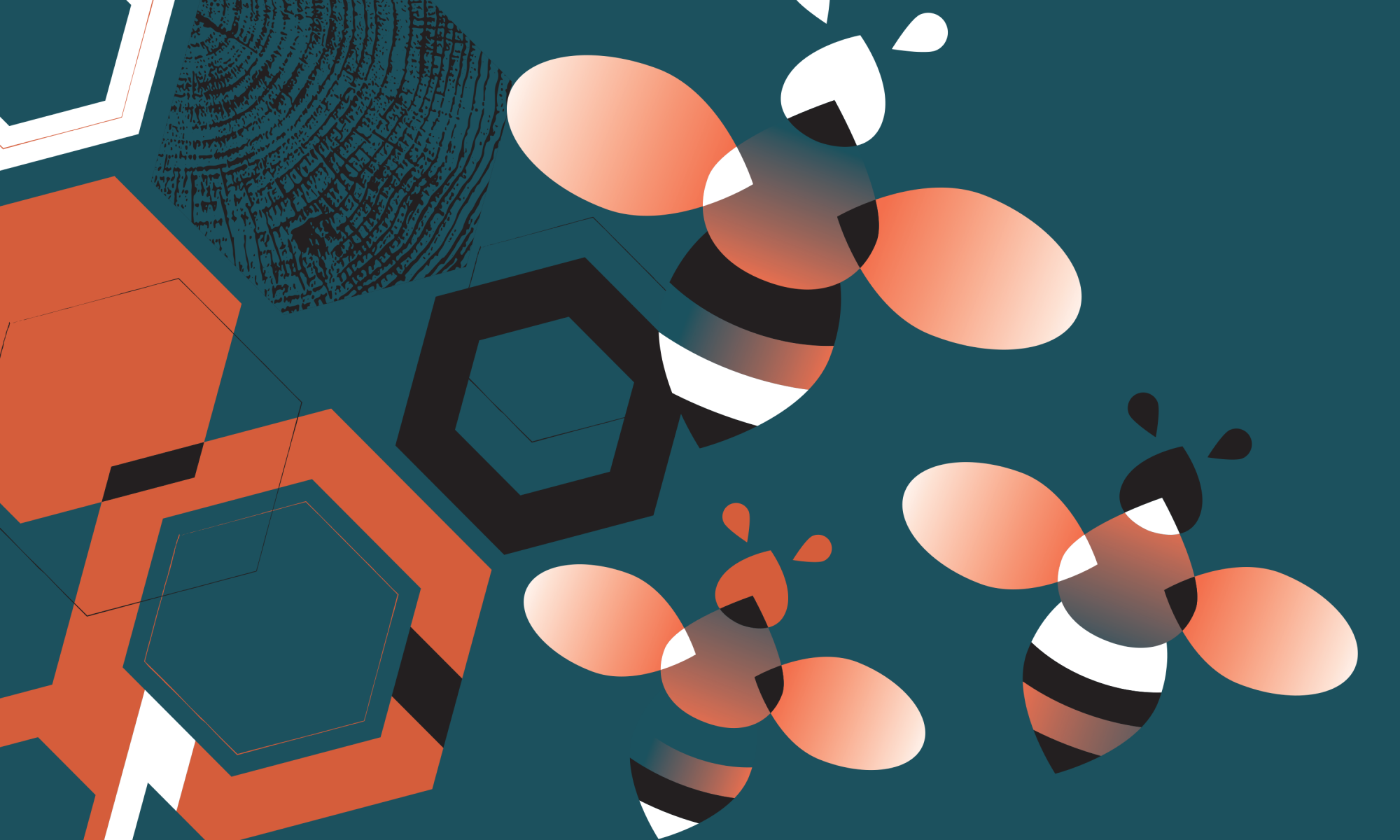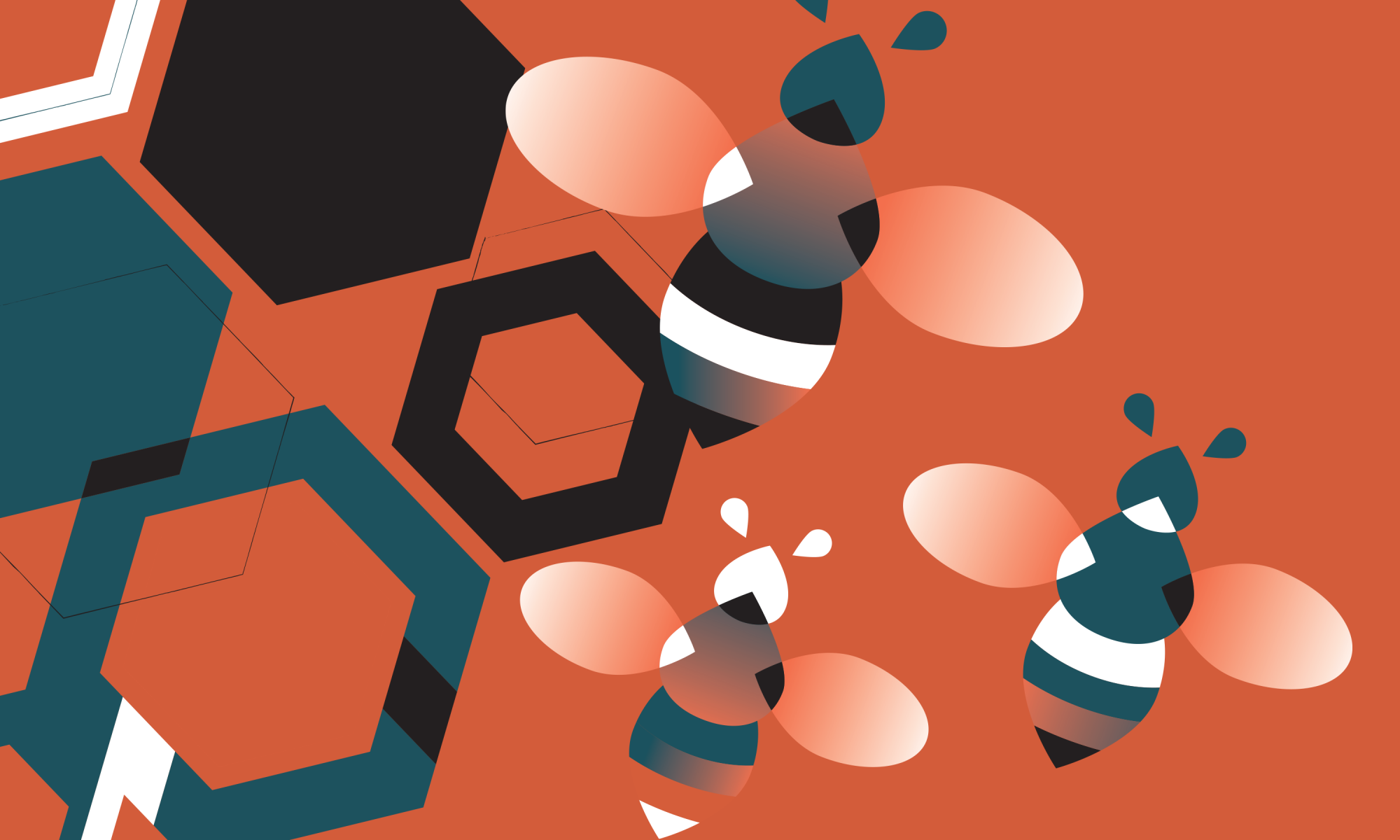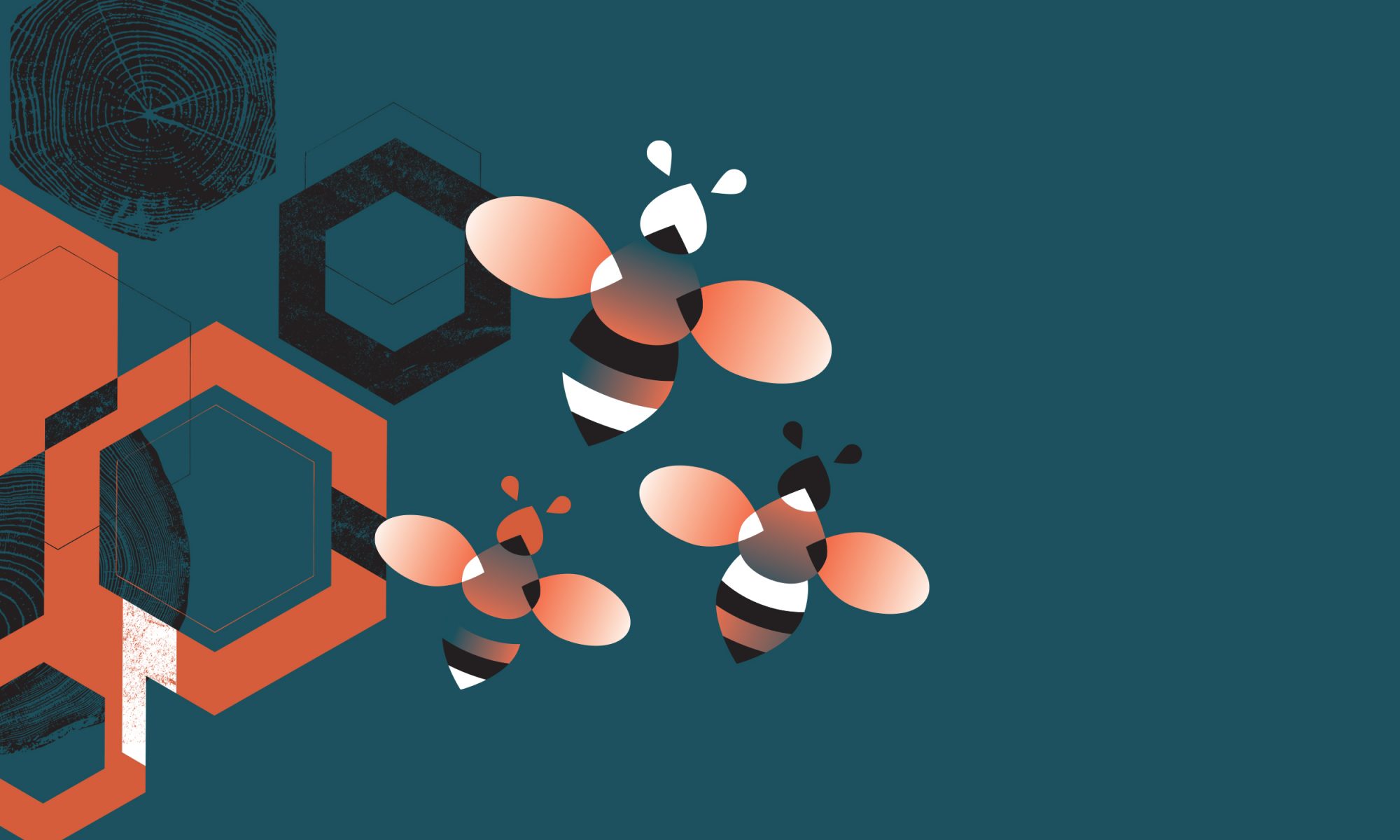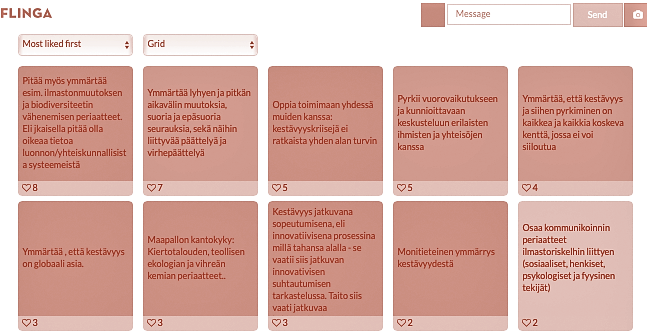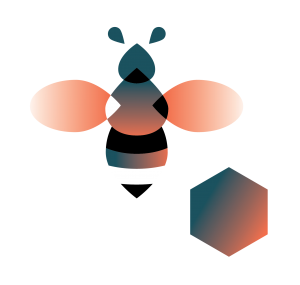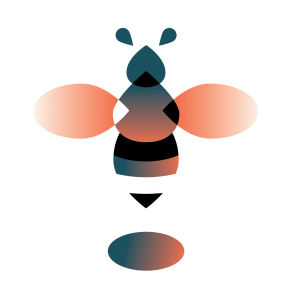In Finnish below!
A lot has happened in May and June on the course-development front. The development team hosted a workshop at the Vice-rector’s summer meeting for the University of Helsinki pedagogical network (more on this later) and presented a proposal of the core contents and learning goals to the Academic Affairs Council. The proposal is based on expert interviews, student survey results, staff workshops and literature.
The meeting of the Academic Affairs Council ended up being very encouraging, as the steering group’s proposal received positive feedback, which ultimately means that the planning can continue in the fall. This feedback will also help with refining some of the learning objectives and will be helpful for the development process in the future as well. Some vice-deans voiced their worries on student workload, which is a concern in the planning of a course such as this one – however, this will be kept in mind going forward.
You can read the proposal in full on University of Helsinki Onedrive. To give you the long and short of it, though, the proposed course has the following learning objectives for students to:
- Understand the complexities involved with sustainability and the multidisciplinary and the philosophical and ethical dimensions of the subject matter
- Understand their own role as an expert, as an individual, and as a member of a society in solving sustainability challenges
- Have the ability to discuss sustainability-related questions in an empathetic and constructive manner, and to understand alternative viewpoints
- Understand the changes, and the related processes, phenomena and potential solutions to sustainability challenges
- Have the ability to apply sustainability-related knowledge in a multidisciplinary project
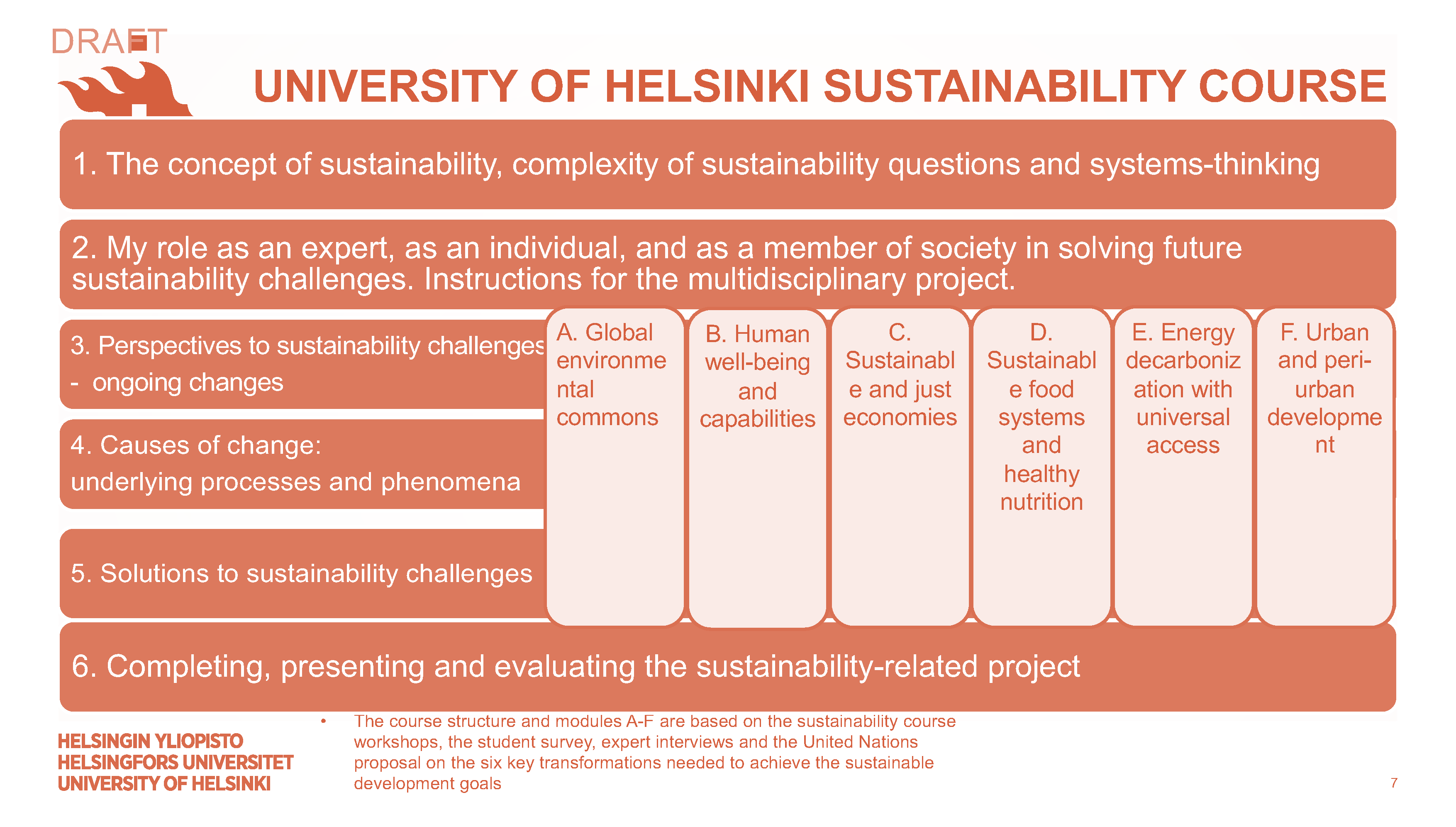
The course itself would be based on six steps (see picture above), during which the student would familiarize themselves with sustainability as a concept, the complexities involved with sustainability questions, multidisciplinarity, and systems-thinking (1). The student would also think about their role as an expert, as an individual and as a member of society in solving sustainability challenges (2). During later stages of the course, students would examine the changes (3), underlying processes and phenomena (4) as well as solutions (5) related to sustainability challenges through six cross-cutting multidisciplinary thematic modules (A-F, see picture above). The student will study some of these themes more in depth.
During the course, the student will complete a project together with a group of students from different disciplines. The project will be evaluated by peers. The ethical and philosophical questions on sustainability will be integrated across the course, not as a separate element. The course structure and modules A-F are based on the sustainability course workshops, the student survey, expert interviews and the United Nations proposal on the six key transformations needed to achieve the sustainable development goals (United Nations, 2019, see pictures below).
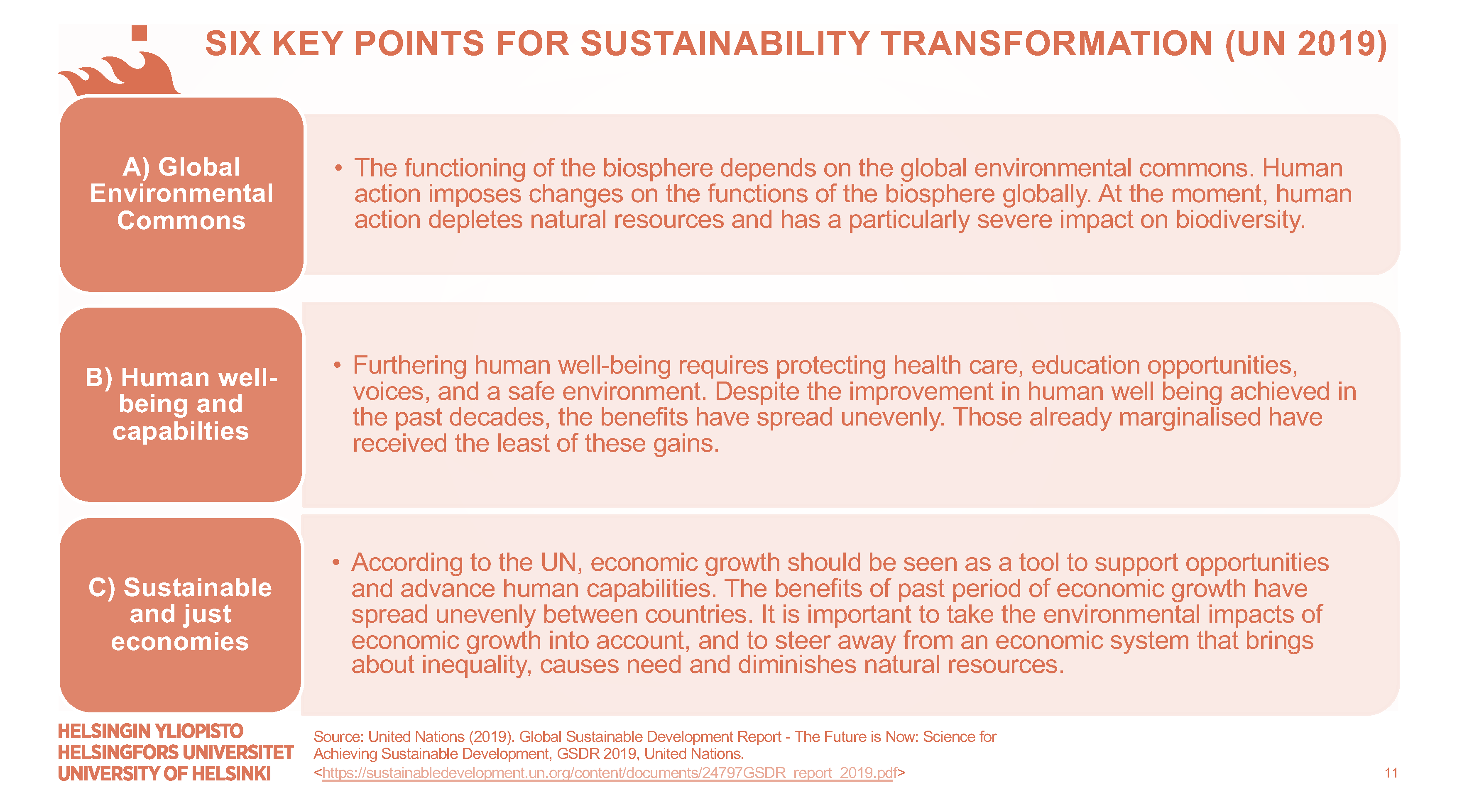
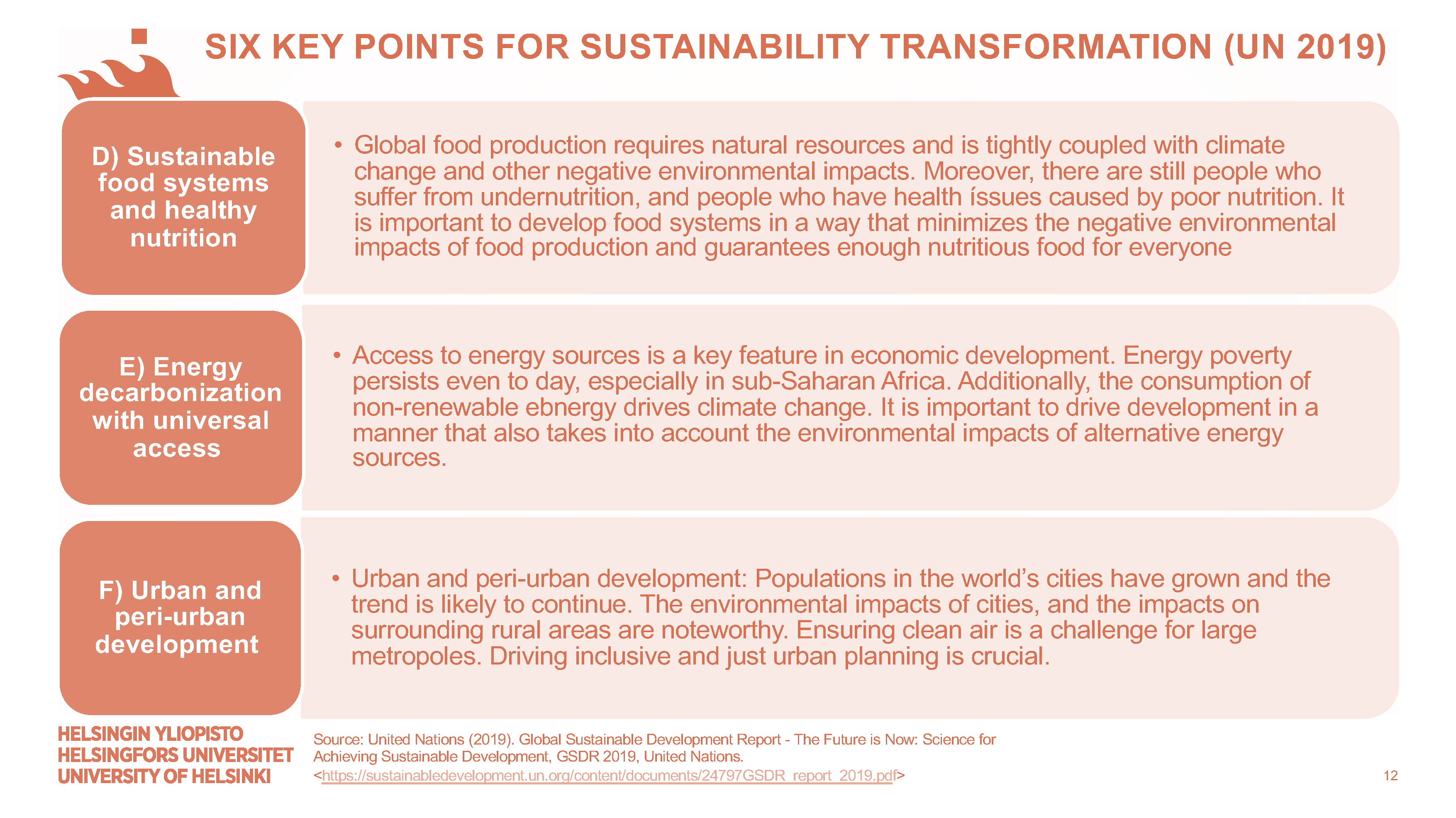
The development of course content will begin in August – we will keep you up to date here on our blog and our mailing list (instructions on joining here). The idea is to gather thematic groups to work on the different elements of the course, with representatives from different disciplines. You can also keep up with the course planning on our Teams-area. Joining is easy – just follow this link. You are welcome to join the planning and creation of the teaching materials for the MOOC – more information will be coming in August. In the meantime, we wish you a warm and relaxing summer.
Osaamistavoitteet ja ydinsisällöt kestävyyskurssille – seuraavat askeleet ja kurssin valmistelu syksyllä
Kurssin suunnittelu on edennyt touko- ja kesäkuussa vauhdilla. Kurssia on esitelty muun muassa vararehtorin ja yliopiston pedagogiikkatoimijoiden kesätapaamisessa. Lisäksi opetusvaradekaanit käsittelivät ehdotusta kurssin oppimistavoitteiksi ja ydinsisällöiksi opintoasiainneuvoston kokouksessa. Ehdotus on laadittu avointen työpajojen, haastattelujen ja opiskelijakyselyn tulosten sekä kirjallisuuden pohjalta.
Opintoasiainneuvosto otti kurssin vastaan positiivisesti. Saimme kuitenkin opetusvaradekaaneilta palautetta, joiden pohjalta kurssin oppimistavoitteita pystytään vielä tarkentamaan. Tämän lisäksi opintoasiainneuvosto toivoi, että kurssin suunnittelussa pidettäisiin huolta siitä, että työtaakka ei muodostu opiskelijoille liian raskaaksi. Nämä asiat pyritäänkin huomioimaan kurssin suunnittelussa.
Opintoasiainneuvostolle esitellyt materiaalit voi lukea kokonaisuudessaan täältä – linkki aukeaa Helsingin yliopiston Onedriveen, joten tarvitset yliopiston käyttäjätunnuksen. Kurssin oppimistavoitteet ovat seuraavanlaiset:
Opiskelija…
- Ymmärtää kestävyyskysymysten kompleksisuutta, monitieteisyyttä sekä kestävyyden eettisiä ja filosofisia ulottuvuuksia.
- Ymmärtää omat roolinsa asiantuntijana, yksilönä ja yhteiskunnan jäsenenä kestävyyskysymysten ratkaisemisessa.
- Osaa keskustella empaattisesti ja rakentavasti kestävyyskysymyksistä ja ymmärtää toisten ihmisten näkökulmia.
- Ymmärtää kestävyyshaasteisiin liittyviä muutoksia, niiden taustalla olevia prosesseja ja ilmiöitä sekä mahdollisia ratkaisukeinoja.
- Osaa soveltaa kestävyyteen liittyviä tietoja monitieteisessä projektityöskentelyssä.
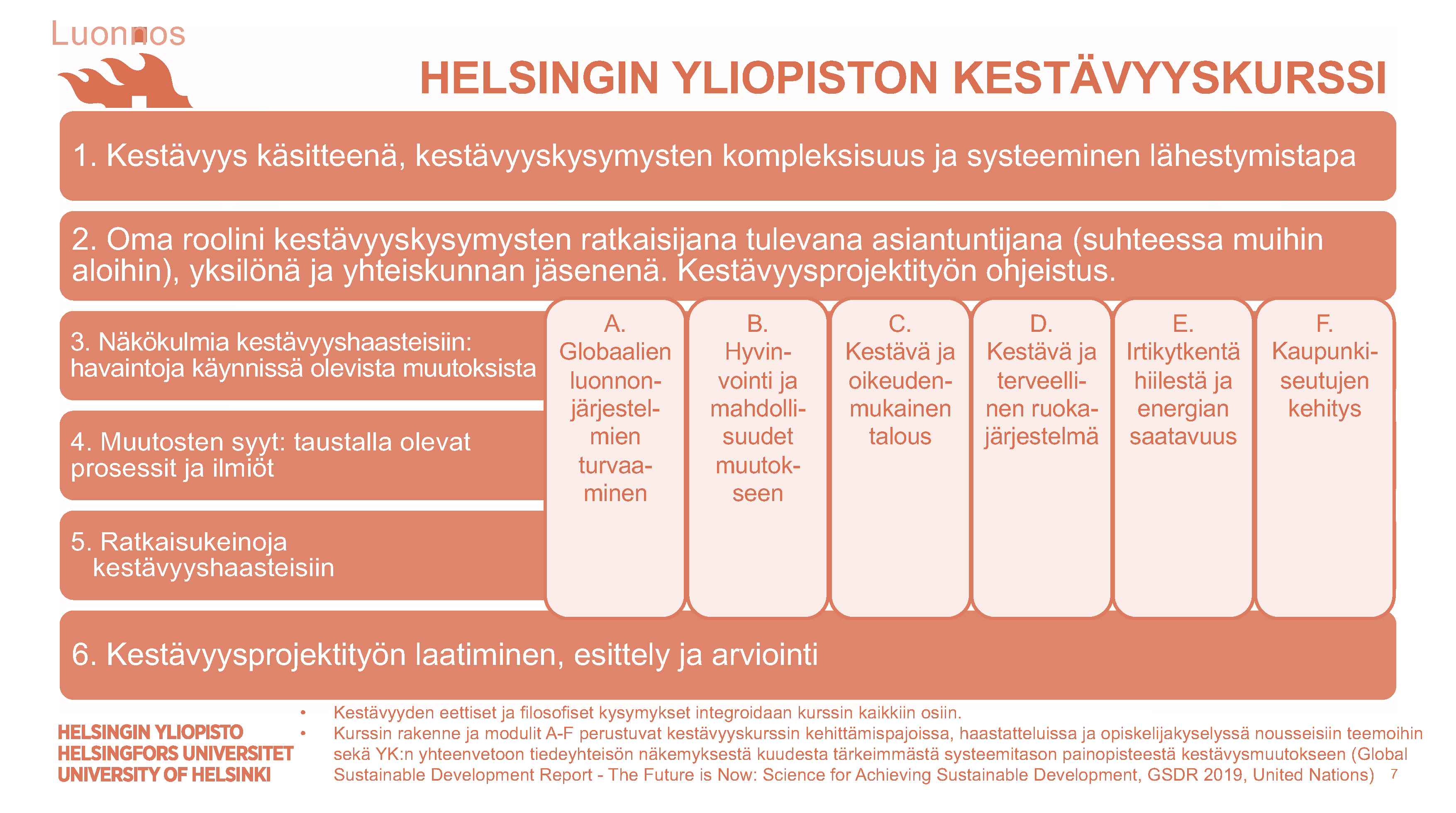
Kestävyyskurssi rakentuu ehdotuksessa kuudesta vaiheesta (ks. yllä oleva kuva), joiden aikana opiskelija tutustuu kestävyyteen käsitteenä, kestävyyskysymysten kompleksisuuteen ja monitieteisyyteen sekä systeemiseen lähestymistapaan (1). Opiskelija pohtii kurssilla omaa rooliaan kestävyyskysymysten ratkaisijana tulevana oman alansa asiantuntijana (suhteessa muiden alojen opiskelijoihin), yksilönä ja yhteiskunnan jäsenenä (2). Globaaleihin kestävyyshaasteisiin liittyviä muutoksia (3), muutosten taustalla olevia prosesseja ja ilmiöitä (4) sekä ratkaisukeinoja kestävyyshaasteisiin tarkastellaan kuuden läpileikkaavan monitieteisen temaattisen modulin kautta (A-F), joista opiskelija keskittyy tarkemmin osaan (esim. 1-2 teemaan perehtyminen tarkemmin).
Kestävyyskurssin aikana opiskelija laatii monitieteisessä ryhmässä projektityön, joka vertaisarvioidaan. Kestävyyden eettiset ja filosofiset kysymykset integroidaan kurssin kaikkiin osiin läpileikkaavana teemana.
Kurssin rakenne ja modulien teemat perustuvat kestävyyskurssin kehittämispajoissa, haastatteluissa ja opiskelijakyselyissä nousseisiin teemoihin sekä YK:n esitykseen (Yhdistyneet Kansakunnat 2019, ks. kuvat alla) tiedeyhteisön kokonaisnäkemyksestä kuudesta tärkeimmästä systeemitason painopisteestä kestävyysmuutokseen, joihin keskittymällä YK:n kestävän kehityksen tavoitteiden saavuttamista voidaan vauhdittaa.
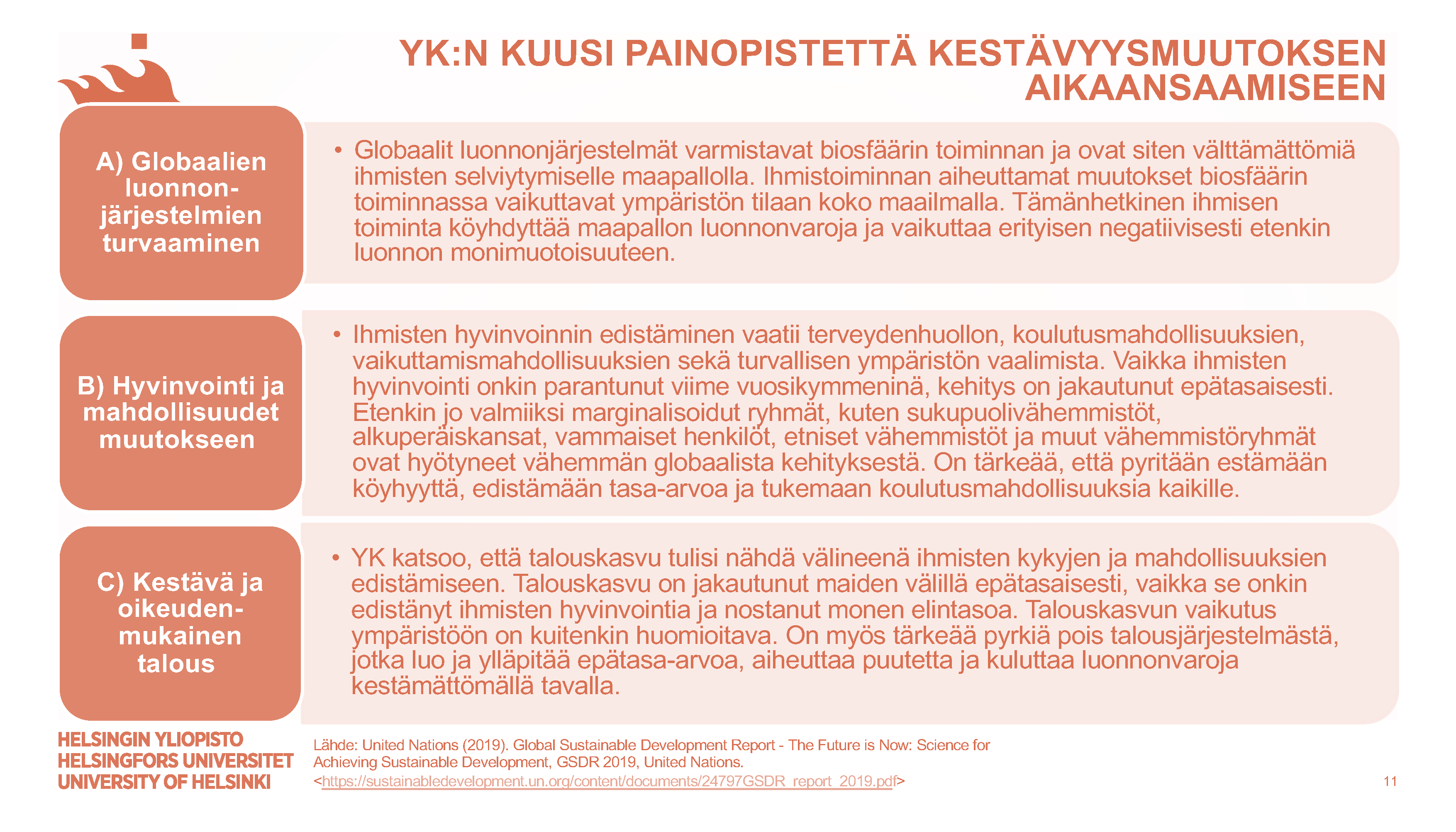
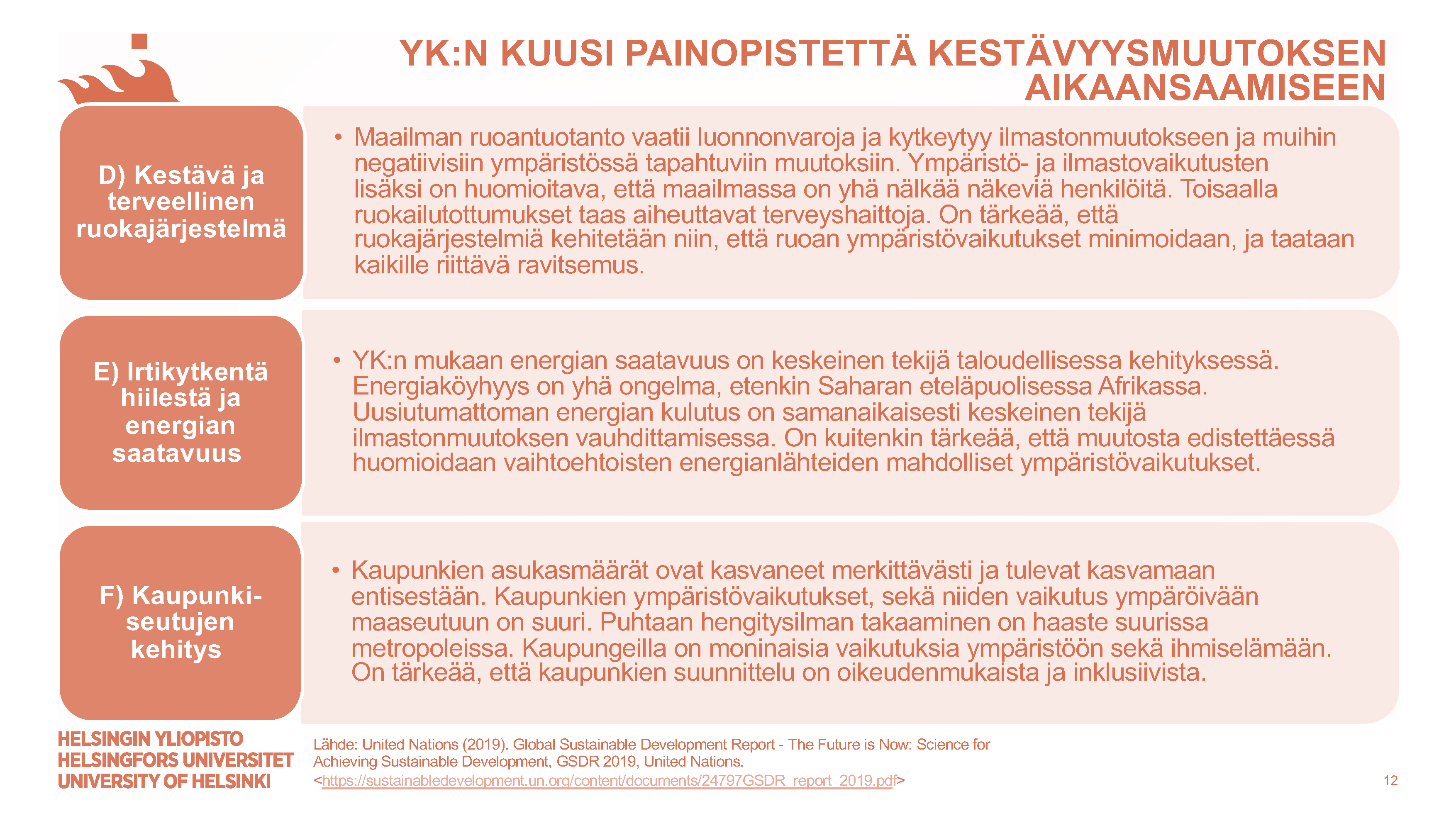
Kurssin kehittäminen jatkuu elokuussa kurssin rakenteen pohjalta koostettavissa teemaryhmissä. Tavoitteena on, että monien eri tieteenalojen edustajia saataisiin mukaan kurssin suunnitteluun ja opetusmateriaalien rakentamiseen MOOC-kurssia varten. Suunnittelutyötä on helppo seurata esimerkiksi kurssikehittäjien Teams-alueella, jolle voi liittyä tämän linkin kautta. Lisäksi tiedotusta voi seurata täällä blogissa, sekä sähköpostilistallamme. Toivotamme kaikki kiinnostuneet mukaan kehitystyöhön, ja tiedotamme asiasta lisää elokuussa. Lämmintä ja rentouttavaa kesää kaikille!

